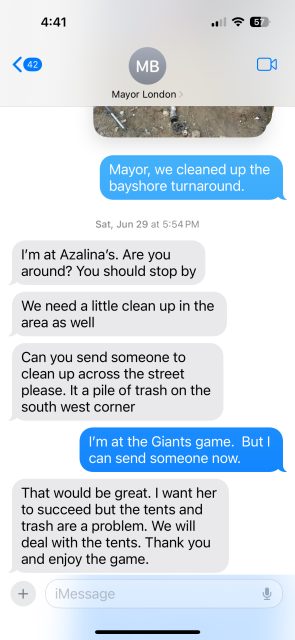The Sunshine Ordinance Task Force, San Francisco’s oversight body responsible for public records and transparency laws, unanimously ruled on Wednesday night that Mayor London Breed and City Attorney David Chiu both violated city law by deleting text messages dealing with official business.
The eight members of the task force in attendance — two were absent, and one seat is vacant — also unanimously referred the mayor’s actions to the San Francisco Ethics Commission for investigation and possible discipline.
“This seems like such an egregious practice,” said Dean Schmidt, an attorney and task force member. “This is a person who’s probably constantly sending messages around the city, and yet … none of them are making it to the public record. I mean, that is a quantum violation, in my estimation, of public records laws.”
“It means everything’s been deleted,” Schmidt continued, indicating not just a “negligent” approach or “carelessness,” he said, but “willful” deletion. “Someone is saying to the rest of us: ‘Screw you, I’m not going to show you any of my texts.’”
Mission Local first reported on the mayor’s practice of deleting texts in mid-September, after the Sunshine task force heard of the practice at a hearing on Aug. 20. Mission Local spoke to a half-dozen public records experts who said the practice likely violates California state law requiring retaining records for two years.
At the Wednesday hearing, the task force was ruling on a complaint brought forth by Hazel Williams, an activist and public records filer who regularly requests text messages from Breed.
Williams had uncovered the text deletion practice after she requested the most recent texts from Breed — that is, any text message whatsoever dealing with city business. Public officials are required to preserve official records, even if on personal phones; Breed uses her personal phone for work.
While Williams recovered a text discussion between Public Works head Carla Short and Breed via Public Works, Breed’s office said the mayor had no text messages responsive to the requests, indicating that Breed routinely deletes them. In part citing a 1995 city attorney memo, the mayor’s office has argued that text messages are “non-records” for the purposes of retention, and that Breed and other mayoral staff can choose to delete them.
On Wednesday, the mayor’s legal compliance officer said that the key question, for retention purposes, is whether communications “memorialize an official action” or are “official evidence” of city activities. Public records attorneys have said that’s too narrow a view.
 Mayor London Breed’s exchange with Carla Short, the director of Public Works, on June 29, 2024.
Mayor London Breed’s exchange with Carla Short, the director of Public Works, on June 29, 2024.
Williams also requested text messages this summer from City Attorney David Chiu to Breed; Chiu’s office said they had none. She then brought both cases to the Sunshine Ordinance Task Force for investigation.
The task force pointed to the Sunshine Ordinance under San Francisco Administrative Code §67.29-7, which states that “the Mayor and all Department Heads” should keep “all documents and correspondence,” and lists as examples “letters, emails, drafts” and other records.
The ordinance, under §67.34, also states that the “willful failure” of elected officials or department heads to follow the Sunshine Ordinance “shall be deemed official misconduct” to be “handled by the Ethics Commission.” The task force referred Breed’s practice to the Ethics Commission under that section.
In a statement sent Thursday, Jen Kwart, the city attorney’s spokesperson, who spoke at the hearing on Wednesday, said the task force’s ruling “simply does not have a basis in the law,” and pointed to a legal memo the office had drafted.
“The law doesn’t require that every document that could be subject to disclosure must be retained for two years,” the statement read. “It is disappointing that the Task Force chose to ignore a California Attorney General opinion and over 40 years of established practice.”
Hank Heckel, the mayor’s legal compliance officer, added in a statement: “The law does not require keeping every single document ever generated by the City government for two years.”
During the hearing, however, commissioners made it clear: They are disturbed by the practice of officials deleting text messages, and perplexed by the legal arguments from the mayor and city attorney.
“If she occasionally uses her phone to text for city business, shouldn’t there have been something on her phone?” asked Lila LaHood, a Sunshine Task Force member and the executive director of the nonprofit San Francisco Public Press, speaking to Heckel.
Heckel said the mayor had no text messages.
“So you’re saying she’s deleting the messages that pertain to city business?” LaHood continued.
“I don’t know,” Heckel said; Breed could be deleting text messages, he said, or she could have “gotten a new phone” and the texts were lost. That would indicate that Breed is getting a new phone every day, as Williams has requested texts from her office every day since Aug. 29.
As long as the text messages do not have “ongoing significance,” Breed is free to delete them, Heckel added. In the past, Heckel pointed to a 2014 retention policy that the office has interpreted as allowing the mayor and her staff to delete routine communications.
“Honestly, the only thing that you’ve said that makes sense to me is maybe she got a new phone, because everything else doesn’t,” LaHood replied. “It doesn’t make sense to me that somebody would systematically delete all of their messages … I’m baffled.”
Earlier in the hearing, when Kwart from the city attorney’s office spoke, she likened Chiu’s deletion of texts to “good phone hygiene,” because the texts are not substantive. Chiu and Breed text “about once a month,” she said, sending messages along the lines of “Hey, can I call you?” Those texts, she added, Chiu deletes.
“I find it quite suspicious, the idea from both parties today … that it’s like, ‘Oh well, for good housekeeping, we’re deleting these minor text messages between two departments,” said Saul Sugarman, a task force member and the editor-in-chief of the Bold Italic. Like the other seven commissioners present, he voted to find both Breed and Chiu in violation.
“I think that’s an excellent point,” replied Matt Yankee, who has years of experience working for different Bay Area city governments, and chairs the commission. The texts, several commissioners said, frequently deal with city business, like directing staff to do police enforcement or clean-up operations.
Public records experts told Mission Local that the officials’ deletion practice opens the city up to litigation, and it is unclear that the practice will change without a lawsuit, since the mayor’s office and city attorney’s office both hold that texts do not rise to the level of an official public record.
In only referring the mayor’s deletion to the Ethics Commission, the task force members noted that Breed’s practice is not new: In 2020, Williams first publicized a trove of text messages between Breed and staff, in which she personally directed them to clean up street trash and homeless encampments.
Since then, Williams said she has not received any text messages from the mayor.
The fact that the mayor has not turned over texts since 2020, said Yankee, indicated a practice of “Don’t save ‘em on the phone anymore. If you are going to send ‘em out, delete ‘em real fast.”
This year, Williams has requested the mayor’s latest text messages every single day, at midnight, since Aug. 29.
Breed’s office has responded to her with the same, simple message: “The Office of the Mayor has performed a reasonable and diligent search in response to your request. We have not located any responsive records.”
Copyright for syndicated content belongs to the linked Source link






